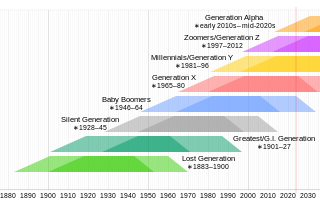 W
WThe 2000s was a decade of the Gregorian calendar that began on January 1, 2000, and ended on December 31, 2009.
 W
WThe 2010s was a decade of the Gregorian calendar that began on 1 January 2010 and ended on 31 December 2019.
 W
WThe 2020s is the decade in the Gregorian calendar which began on 1 January 2020 and will end on 31 December 2029. It is commonly referred to as "the current decade", but this is not universally agreed.
 W
WAfrican century is the belief or hope that the 21st century will bring peace, prosperity and cultural revival to Africa. Among those who have spoken of an African century are South African politicians Thabo Mbeki and Nkosazana Dlamini-Zuma, Chevron CEO David J. O'Reilly, US Treasury Secretary Paul O'Neill and celebrity campaigner Bono. It has also inspired a radical policy journal - African Century Journal founded in 1999.
 W
WThe Age of Oil, also known as the Oil Age, the Petroleum Age, or the Oil Boom, refers to the era in human history characterised by an increased use of petroleum in products and as fuel. Though unrefined petroleum has been used for various purposes since ancient times, it was during the 19th century that refinement techniques were developed and gasoline engines were created.
 W
WThe Asian Century is the projected 21st-century dominance of Asian politics and culture, assuming certain demographic and economic trends persist. The concept of Asian Century parallels the characterisation of the 19th century as Britain's Imperial Century, and the 20th century as the American Century and Pax Sovietica.
 W
WGeneration Z, or Gen Z for short, are the demographic cohort succeeding Millennials and preceding Generation Alpha. Researchers and popular media use the mid-to-late 1990s as starting birth years and the early 2010s as ending birth years. Most members of Generation Z are the children of Generation X and sometimes millennials.
 W
WGeneration Z, or Gen Z for short, are the demographic cohort succeeding Millennials and preceding Generation Alpha. Researchers and popular media use the mid-to-late 1990s as starting birth years and the early 2010s as ending birth years. Most members of Generation Z are the children of Generation X and sometimes millennials.
 W
WGeneration Z, or Gen Z for short, are the demographic cohort succeeding Millennials and preceding Generation Alpha. Researchers and popular media use the mid-to-late 1990s as starting birth years and the early 2010s as ending birth years. Most members of Generation Z are the children of Generation X and sometimes millennials.
 W
WEarth 2100 is a television program that was presented by the American Broadcasting Company (ABC) network on June 2, 2009 and was aired on the History Channel in January 2010 and was shown through the year. Hosted by ABC journalist Bob Woodruff, the two-hour special explored what "a worst-case" future might look like if humans do not take action on current or impending problems that could threaten civilization. The problems addressed in the program include current climate change, overpopulation, and misuse of energy resources.
 W
WThe European Union (EU) has been called a potential superpower by scholars and academics like T. R. Reid, Andrew Reding, Andrew Moravcsik, Mark Leonard, Jeremy Rifkin, John McCormick and some politicians such as Romano Prodi and Tony Blair. They believe that the EU is a superpower, or will become one, in the 21st century – while noting that the concept of "superpower" has changed to one of soft power rather than the hard (military) superpowers of the 20th century. Others have challenged their views.
 W
WGeneration Alpha is the demographic cohort succeeding Generation Z. Researchers and popular media use the early 2010s as the starting birth years. Named after the first letter in the Greek alphabet, Generation Alpha is the first to be born entirely in the 21st century. Most members of Generation Alpha are the children of Millennials.
 W
WGeneration Z, or Gen Z for short, are the demographic cohort succeeding Millennials and preceding Generation Alpha. Researchers and popular media use the mid-to-late 1990s as starting birth years and the early 2010s as ending birth years. Most members of Generation Z are the children of Generation X and sometimes millennials.
 W
WGeneration Alpha is the demographic cohort succeeding Generation Z. Researchers and popular media use the early 2010s as the starting birth years. Named after the first letter in the Greek alphabet, Generation Alpha is the first to be born entirely in the 21st century. Most members of Generation Alpha are the children of Millennials.
 W
WGeneration Z, or Gen Z for short, are the demographic cohort succeeding Millennials and preceding Generation Alpha. Researchers and popular media use the mid-to-late 1990s as starting birth years and the early 2010s as ending birth years. Most members of Generation Z are the children of Generation X and sometimes millennials.
 W
WThe March for Our Lives (MFOL) is a student-led demonstration in support of legislation to prevent gun violence in the United States. It took place in Washington, D.C., on March 24, 2018, with over 880 sibling events throughout the United States and around the world, and was planned by Never Again MSD in collaboration with the nonprofit organization. The event followed the Marjory Stoneman Douglas High School shooting a month earlier, which was described by several media outlets as a possible tipping point for gun control legislation.
 W
WGeneration Z, or Gen Z for short, are the demographic cohort succeeding Millennials and preceding Generation Alpha. Researchers and popular media use the mid-to-late 1990s as starting birth years and the early 2010s as ending birth years. Most members of Generation Z are the children of Generation X and sometimes millennials.
 W
WGeneration Z, or Gen Z for short, are the demographic cohort succeeding Millennials and preceding Generation Alpha. Researchers and popular media use the mid-to-late 1990s as starting birth years and the early 2010s as ending birth years. Most members of Generation Z are the children of Generation X and sometimes millennials.
 W
WGeneration Z, or Gen Z for short, are the demographic cohort succeeding Millennials and preceding Generation Alpha. Researchers and popular media use the mid-to-late 1990s as starting birth years and the early 2010s as ending birth years. Most members of Generation Z are the children of Generation X and sometimes millennials.
 W
WThe Republic of India is considered one of the emerging superpowers of the world. This potential is attributed to several indicators, the primary ones being its demographic trends and a rapidly expanding economy and military. In 2015, India became the world's fastest growing economy with a 7.5% estimated GDP rate. The country must overcome many economic, social, and political problems before it can be considered a superpower. It is also not yet as influential on the international stage when compared to the United States, China and the former Soviet Union.
 W
WThe Industrial Age is a period of history that encompasses the changes in economic and social organization that began around 1760 in Great Britain and later in other countries, characterized chiefly by the replacement of hand tools with power-driven machines such as the power loom and the steam engine, and by the concentration of industry in large establishments.
 W
WThe Information Age is a historical period that began in the mid-20th century, characterized by a rapid epochal shift from the traditional industry established by the Industrial Revolution to an economy primarily based upon information technology. The onset of the Information Age can be associated with the development of transistor technology, particularly the MOSFET, which became the fundamental building block of digital electronics and revolutionized modern technology.
 W
WGeneration Z, or Gen Z for short, are the demographic cohort succeeding Millennials and preceding Generation Alpha. Researchers and popular media use the mid-to-late 1990s as starting birth years and the early 2010s as ending birth years. Most members of Generation Z are the children of Generation X and sometimes millennials.
 W
WGeneration Z, or Gen Z for short, are the demographic cohort succeeding Millennials and preceding Generation Alpha. Researchers and popular media use the mid-to-late 1990s as starting birth years and the early 2010s as ending birth years. Most members of Generation Z are the children of Generation X and sometimes millennials.
 W
WMillennials, also known as Generation Y, are the demographic cohort following Generation X and preceding Generation Z. Researchers and popular media use the early 1980s as starting birth years and the mid-1990s to early 2000s as ending birth years, with 1981 to 1996 a widely accepted defining range for the generation. Most millennials are the children of baby boomers and early Gen Xers; millennials are often the parents of Generation Alpha.
 W
WGeneration Z, or Gen Z for short, are the demographic cohort succeeding Millennials and preceding Generation Alpha. Researchers and popular media use the mid-to-late 1990s as starting birth years and the early 2010s as ending birth years. Most members of Generation Z are the children of Generation X and sometimes millennials.
 W
WPiracy in the 21st century has taken place in a number of waters around the world, including the Gulf of Guinea, Strait of Malacca, Indian Ocean, and Falcon Lake.
 W
WGeneration Z, or Gen Z for short, are the demographic cohort succeeding Millennials and preceding Generation Alpha. Researchers and popular media use the mid-to-late 1990s as starting birth years and the early 2010s as ending birth years. Most members of Generation Z are the children of Generation X and sometimes millennials.
 W
WGeneration Z, or Gen Z for short, are the demographic cohort succeeding Millennials and preceding Generation Alpha. Researchers and popular media use the mid-to-late 1990s as starting birth years and the early 2010s as ending birth years. Most members of Generation Z are the children of Generation X and sometimes millennials.
 W
WA potential superpower is a state or a political and economic entity that is speculated to be—or to have the potential to soon become—a superpower.
 W
WThe retreat of glaciers since 1850 affects the availability of fresh water for irrigation and domestic use, mountain recreation, animals and plants that depend on glacier-melt, and, in the longer term, the level of the oceans. Studied by glaciologists, the temporal coincidence of glacier retreat with the measured increase of atmospheric greenhouse gases is often cited as an evidentiary underpinning of global warming. Mid-latitude mountain ranges such as the Himalayas, Rockies, Alps, Cascades, and the southern Andes, as well as isolated tropical summits such as Mount Kilimanjaro in Africa, are showing some of the largest proportionate glacial losses.
 W
WWomen's suffrage, the legal right of women to vote, has been depicted in film in a variety of ways since the invention of narrative film in the late nineteenth century. Some early films satirized and mocked suffragists and Suffragettes as "unwomanly" "man-haters," or sensationalized documentary footage. Suffragists countered these depictions by releasing narrative films and newsreels that argued for their cause. After women won the vote in countries with a national cinema, women's suffrage became a historical event depicted in both fiction and nonfiction films.
 W
WGeneration Z, or Gen Z for short, are the demographic cohort succeeding Millennials and preceding Generation Alpha. Researchers and popular media use the mid-to-late 1990s as starting birth years and the early 2010s as ending birth years. Most members of Generation Z are the children of Generation X and sometimes millennials.